Review of Battle Of Algiers, The: The Criterion Collection
Introduction
Algeria was integrated into the French Fourth Republic in 1830 when French troops invaded Algiers and France arguably began a reign of terror in Algeria, `disappearing` about a third of the population. In 1954, the National Liberation Front (FLN) rose up against French rule with a guerrilla war: assassinating soldiers and bombing civilians in French areas. The French met the uprising with an escalation of violence, including the use of torture. Saadi Yacef was a commander in the FLN and, whilst imprisoned by the French, wrote his memoirs, `Souvenirs de la Bataille d`Alger`.
When the Fourth Republic collapsed in 1958, the war for independence was nearly won, and Algeria became an independent country in 1962. Keen to make a film based on his memoirs, and with backing from the Algerian government of which he was a part, Yacef approached the Italian director Gillo Pontecorvo and screenwriter Franco Solinas. Solinas wrote a screenplay that saw the war from a neutral point of view, a role written for Paul Newman, but Yacef and fellow FLN member Salash Baazi felt that the plight of the Algerians was underwritten, so wrote their own screenplay. This was considered too anti-French, but eventually Pontecorvo and Yacef settled on a draft that was even-handed, neither demonising the French, nor elevating the FLN to hero status.
`The Battle of Algiers` tells the story of the war from 1954 to 1960 starting in 1957 when a member of the FLN breaks under torture and gives up the location of one of his commanders: Ali La Pointe. The French move into place and tell La Pointe to give himself up or be blown up; the film then moves back to 1954 when La Pointe was a petty criminal and shows his rise in the organisation as the battle escalates. Pontecorvo uses hundreds of Algerian non-professional actors, together with top actors and Saadi Yacef himself, playing a role that is not too far removed from real life. Shot in black and white, and with a vérité style, the film has a documentary feel to it that caused the American distributors to assure audiences that they were not watching newsreel footage. The film became hugely influential, with the IRA and Black Panthers using it as part of training and the Pentagon screened it in 2003 to show the dangers of fighting a counter-insurgency war.
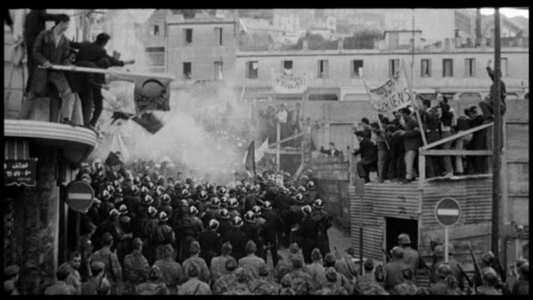
Video
The grainy, neorealist, cinema vérité look suits the subject matter perfectly, and it feels that at times you are watching a documentary on the FLN guerrilla war and the French response to it. The first outing of `The Battle of Algiers` on DVD has been given a stunning treatment by the Criterion Studio and the anamorphic 1.85:1 transfer is nigh on flawless without losing the newsreel/documentary style.
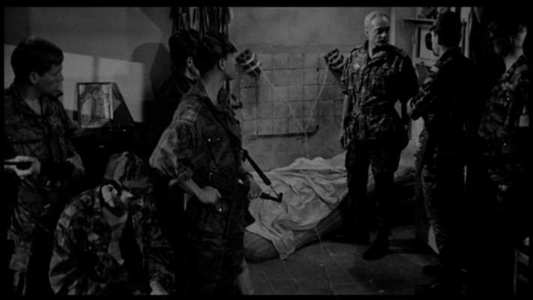
Audio
The disc has the original DD French mono soundtrack, which is beautifully presented. The subtitles are easy to read and free from spelling and grammatical mistakes. The score by Pontecorvo and Ennio Morricone is brilliant and fits in well with the traditional Algerian music.
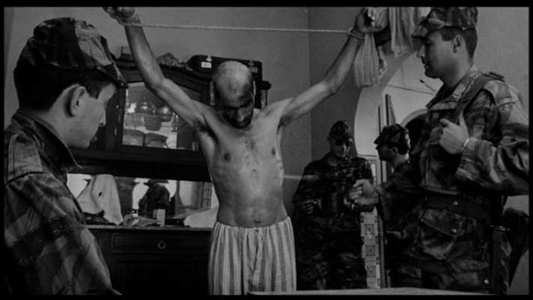
Features
Wow! This is perhaps the most complete and comprehensive set of extra features devoted to a single film that I have seen. A stunning array of supplementary material across three discs, the set also includes a 56 page book with an essay on the film by scholar Peter Matthews, extracts from Yacef`s book, an interview with Solinas and brief biographies on key figures in the French-Algerian War. With nearly five hours of documentaries and other material, this package tells you everything you need to know about the film, it`s historical and contemporary significance, the Algerian struggle for independence, the French response to the armed uprising and Algeria post independence. The extra features are reproduced below from the back of the case.
DISC ONE: THE BATTLE OF ALGIERS
New high-definition digital transfer, enhanced for widescreen televisions
Production gallery
Theatrical and re-release trailers
New and improved English subtitle translation
DISC TWO: PONTECORVO AND THE FILM
Gillo Pontecorvo: The Dictatorship of Truth (1992): a 37-minute documentary, narrated by Edward Said
Exclusive 51-minute documentary of the making of `The Battle of Algiers`, featuring new interviews with the director, cinematographer, composer, editor, actors, and film historians
Five Directors (17 mins., 2004): Spike Lee, Mira Nair, Julian Schnabel, Steven Soderbergh, and Oliver Stone on the film`s influence, style and importance
DISC THREE: THE FILM AND HISTORY
Remembering History (69 mins., 2004): an exclusive documentary that reconstructs the Algerian experience of the battle of independence, featuring interviews with historians and revolutionaries, including military leader Saadi Yacef
"États d`armes" (2002): a 28-min documentary excerpt featuring senior French military officers recording the torture and execution to combat the rebellion
The Battle Of Algiers: A Case Study (25 mins., 2004): Richard A. Clark, former national counterterrorism coordinator and author of `Against All Enemies: Inside America`s War on Terror`, discusses the film`s relevance with Michael A. Sheehan, former State Department coordinator for counterterrorism, in a conversation moderated by Christopher E. Isham, chief of investigative projects for ABC News
Gillo Pontecorvo`s Return to Algiers (58 mins., 1992): the filmmaker revisits the Algerian people after three decades of independence
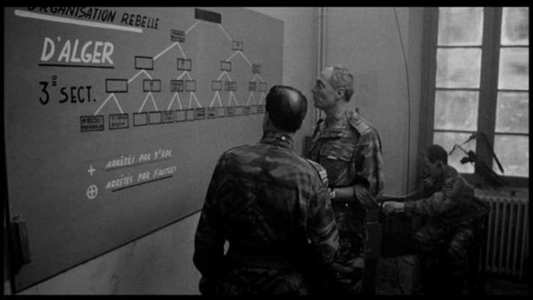
Conclusion
Filming only three years after Algeria gained independence, on location, using non-actors in main roles and thousands of locals as extras, Gillo Pontecorvo created a landmark film that is one of the most important films ever made. `The Battle of Algiers` has barely diminished in significance since it was first released and with the violence in Iraq and is as relevant now as it was in 1966, as evidenced by its screening by the Pentagon and the use of similar tactics by the insurgency in Iraq to those used by the FLN half a century ago.
The phrase `one man`s freedom fighter is another man`s terrorist` was used to describe the Palestine Liberation Organisation, the African National Congress and arguably applies to the FLN who used terrorist methods to secure independence for Algeria. The French were no angels and the parallels drawn between Iraq and Algeria seem perfectly legitimate when you compare this film to news reports of the treatment of prisoners in Abu Ghraib.
As a lesson in how to conduct a guerrilla war, the film is unquestionably accurate; as a depiction of how not to win `hearts and minds`, it is essential viewing for an occupying power and simply as a recreation of the urban insurrection of the FLN against French rule and as a piece of neorealist cinema, it is magnificent. With the remastered picture and wealth of extra features, this may well be the finest DVD package of a single film I own.
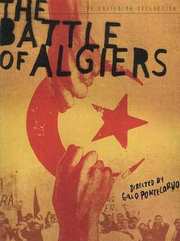
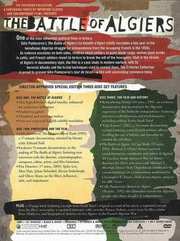




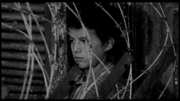
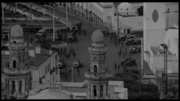
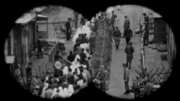

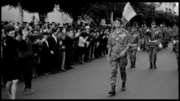
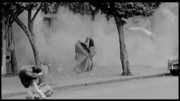
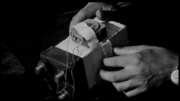
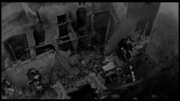
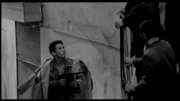
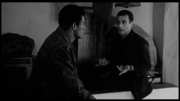
































Your Opinions and Comments
Be the first to post a comment!